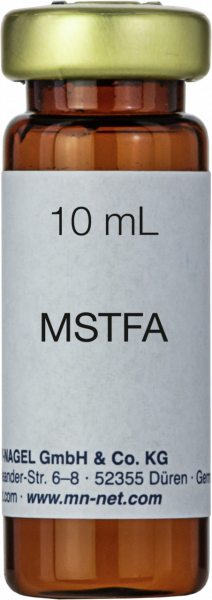Derivatization reagents for GC, silylation, MSTFA
*taxes and shipping not included
The most volatile trimethylsilyl amide available. MSTFA is a very strong TMS donor which does not cause any noticeable FID fouling even after long-time measuring series. The already good solution characteristics can be improved by addition of submolar quantities of protic solvents (e.g., TFA for extremely polar compounds such as hydrochlorides) or pyridine (e.g., for carbohydrates). Advantages of MSTFA are complete reaction with high reaction rates, even without a catalyst (1–2 % TMCS or TSIM) and the by-product of the reaction (N-methyltrifluoroacetamide) features high volatility and short retention time. These products contain harmful substances which must be specially labeled as hazardous. For detailed information please see SDS.
| Selling unit | 1x10 mL, 1x100 mL, 5x10 mL, 6x50 mL, 6x100 mL, 12x100 mL, 20x1 mL |
| Method | Gas chromatography (GC), derivatization |
| Composition | N-methyl-N-trimethylsilyl-trifluoroacetamide (MSTFA) |
| Derivatization type | Silylation |
| Recommended application(s) | Alcohols, Amine hydrochlorides, Amines, Amino acids, Carboxylic acids, Derivatization, Hydroxy acids, Ketocarboxylic acids, Mercaptans and similar compounds with active hydrogen atoms, Often used in doping control and forensic applications, Polyalcohols, Sugars |
| Storage temperature | 2–8 °C / 36–46 °F |
| Hazardous material | Yes |










